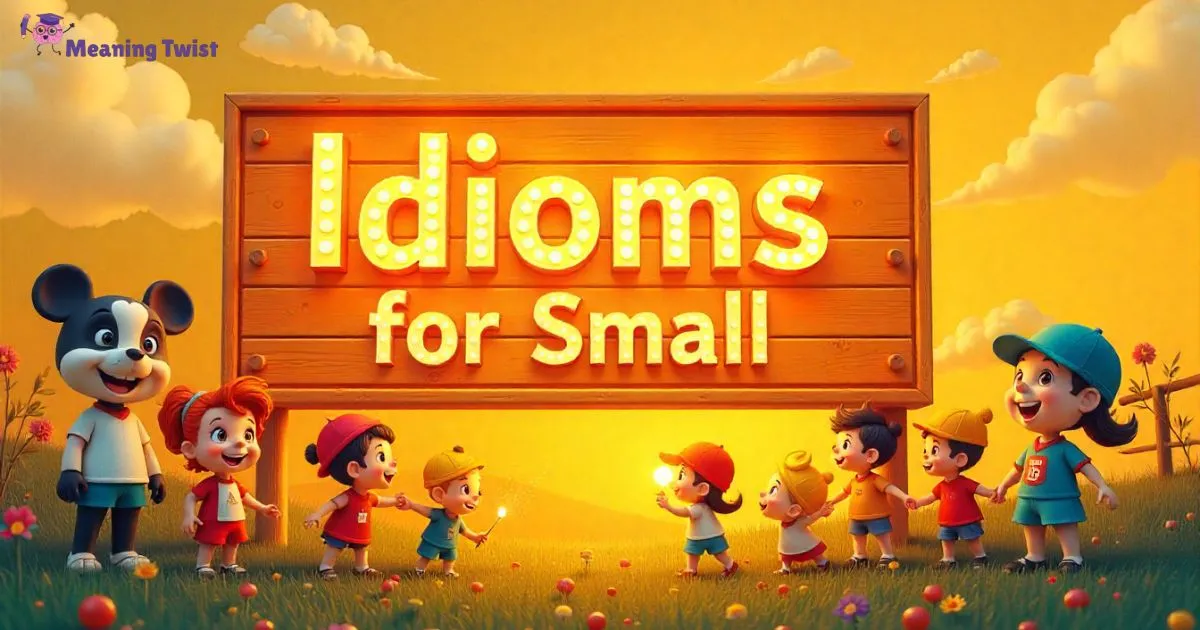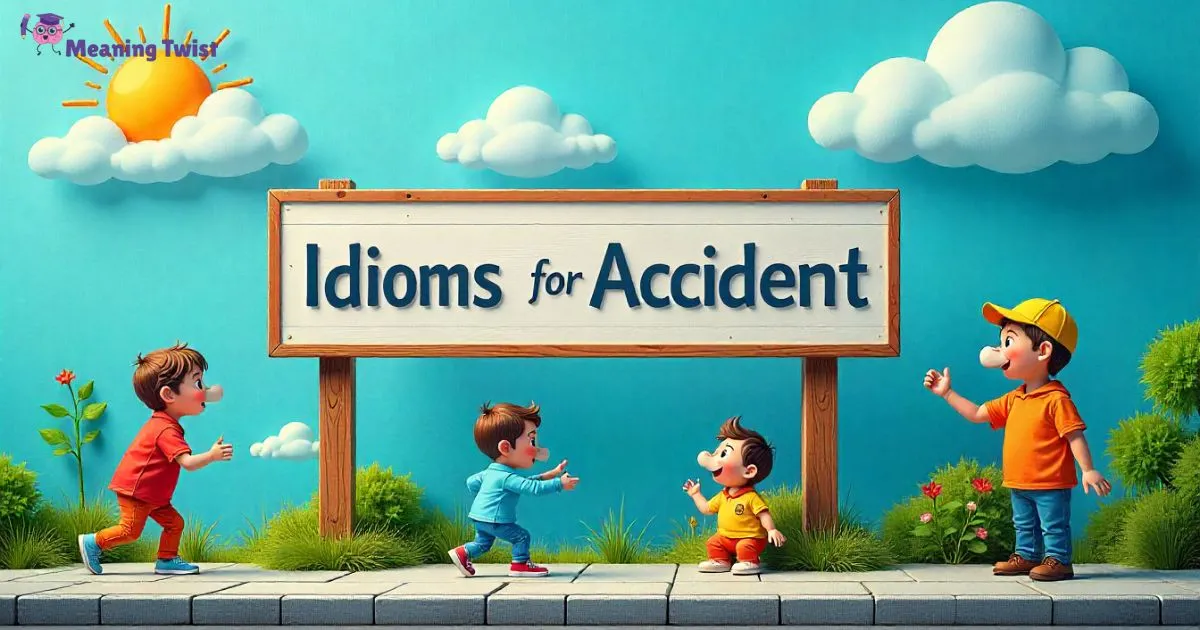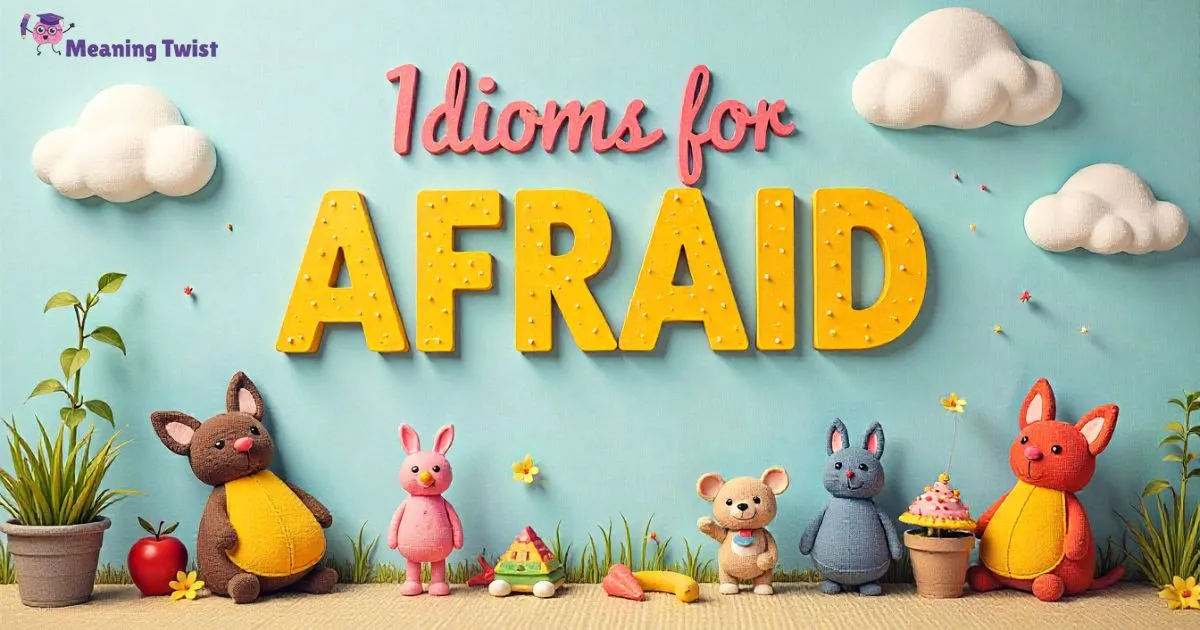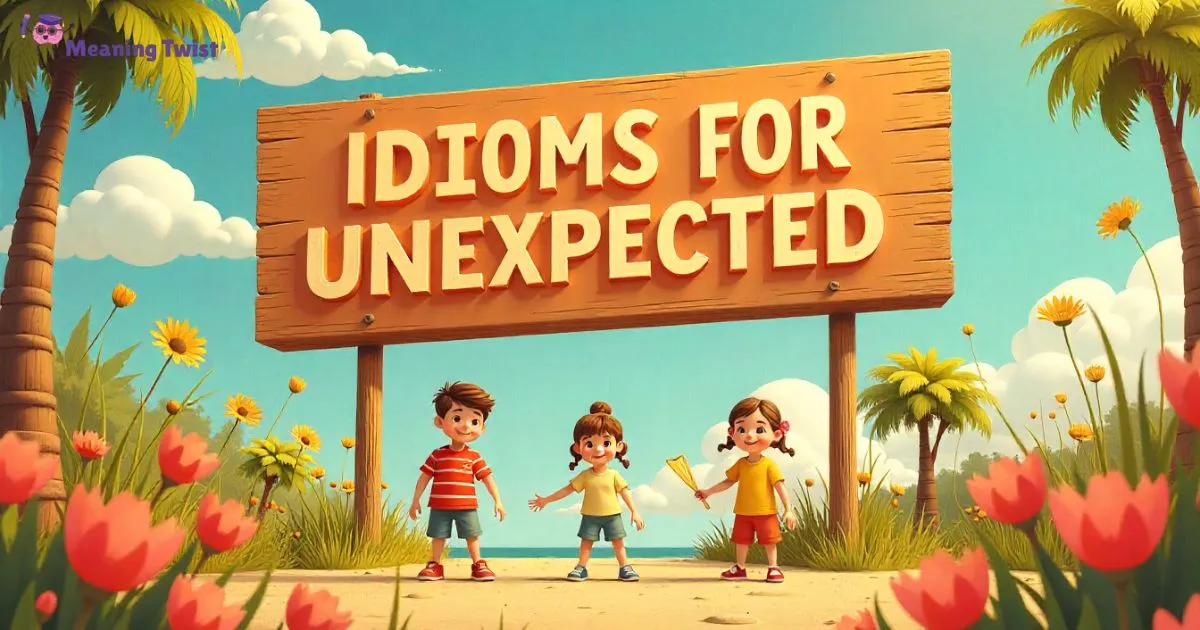Even small things can make a big impact. Using idioms for small makes your language colorful, expressive, and memorable. Instead of just saying “tiny” or “little,” phrases like “a drop in the ocean,” “not a big deal,” or “inch by inch” capture size, scale, or importance creatively.
These idioms help highlight nuances, details, or subtle effects naturally. They make your conversations or writing engaging, relatable, and human, allowing readers or listeners to see the significance of small things in a vivid way.
By incorporating these idioms creatively, you can share stories, emphasize details, or add humor, turning ordinary smallness into memorable expressions that resonate with your audience.
1. A Drop in the Ocean
Meaning: Something very small compared to a larger whole.
Scenario: Efforts, contributions, or resources.
Tip: Use to emphasize scale.
Real-life Example: Donating ten dollars may seem like a drop in the ocean, but combined with hundreds of others, it helped fund the entire charity initiative.
2. Not a Big Deal
Meaning: Something minor or unimportant.
Scenario: Mistakes, favors, or small tasks.
Tip: Use casually to downplay significance.
Real-life Example: I accidentally spilled coffee on the report, but my colleague said it was not a big deal, quickly helping me fix it.
3. Inch by Inch
Meaning: Gradually, step by step.
Scenario: Achievements, growth, or progress.
Tip: Use to emphasize small, steady efforts.
Real-life Example: Learning a new language can feel slow, but inch by inch, I mastered vocabulary and grammar, achieving fluency over months.
4. Tiny but Mighty
Meaning: Small in size but powerful or effective.
Scenario: People, things, or ideas.
Tip: Use for humor or admiration.
Real-life Example: The small puppy was tiny but mighty, bravely protecting the house from the much larger dog next door.
5. A Flea on the Dog
Meaning: Something insignificant or trivial.
Scenario: Minor issues or complaints.
Tip: Use humorously or critically.
Real-life Example: The mistake in the presentation was just a flea on the dog compared to the overall success of the project.
6. Small Fry
Meaning: Someone unimportant or insignificant.
Scenario: Work, social circles, or humor.
Tip: Use informally to describe minor players.
Real-life Example: In the corporate world, I was considered small fry, but with persistence, I climbed the ranks steadily.
7. Petty Cash
Meaning: Small amounts of money.
Scenario: Office, business, or casual finance.
Tip: Use literally or figuratively.
Real-life Example: I used the petty cash to buy office snacks, a small expense that kept everyone happy.
8. Little by Little
Meaning: Gradually or in small steps.
Scenario: Learning, building, or progress.
Tip: Use to encourage patience.
Real-life Example: Little by little, she organized her cluttered room, turning chaos into order over several days.
9. Bite-Sized
Meaning: Small, easy to handle or understand.
Scenario: Food, tasks, or learning.
Tip: Use metaphorically for simplicity.
Real-life Example: The teacher presented the complex topic in bite-sized pieces, making it easy for students to grasp.
10. Small Change
Meaning: Minor amount of money or significance.
Scenario: Finance, contributions, or value.
Tip: Use literally or figuratively.
Real-life Example: Paying ten dollars for the ticket seemed like small change compared to the unforgettable experience of the concert.
11. Small Talk
Meaning: Casual, light conversation.
Scenario: Social interactions, networking, or parties.
Tip: Use socially or casually.
Real-life Example: During the office party, I engaged in small talk with colleagues, building rapport before discussing serious projects.
12. A Small World
Meaning: Coincidental or unexpected connections between people.
Scenario: Meetings, encounters, or travel.
Tip: Use humorously or conversationally.
Real-life Example: Meeting my childhood friend in a foreign country felt like a small world moment, full of surprise and nostalgia.
13. Small Hours
Meaning: Very late at night or early morning.
Scenario: Work, study, or social events.
Tip: Use descriptively for timing.
Real-life Example: We worked into the small hours finishing the project, exhausted but proud of our accomplishment.
14. Small Matter
Meaning: Something minor or trivial.
Scenario: Everyday situations, discussions, or tasks.
Tip: Use to downplay importance.
Real-life Example: Fixing the minor typo in the report was a small matter compared to the overall quality of the presentation.
15. Small Potatoes
Meaning: Insignificant or unimportant things.
Scenario: Work, achievements, or discussions.
Tip: Use humorously or critically.
Real-life Example: The error was small potatoes in comparison to the overall success of the marketing campaign.
16. Small Victory
Meaning: A minor success or achievement.
Scenario: Work, studies, or personal goals.
Tip: Use to celebrate little accomplishments.
Real-life Example: Completing the first chapter of my novel felt like a small victory, motivating me to continue writing every day.
17. Small Change, Big Impact
Meaning: Small actions can lead to significant results.
Scenario: Charity, work, or personal efforts.
Tip: Use to inspire or encourage.
Real-life Example: Donating just a few books to the local library seemed minor, but small change, big impact—many children benefited from the gesture.
18. Small Fish
Meaning: A person of little importance in a group or organization.
Scenario: Work, society, or social groups.
Tip: Use metaphorically or informally.
Real-life Example: Initially, I was a small fish in the company, but by learning and networking, I gradually earned recognition.
19. Small Wonder
Meaning: Not surprising; something expected.
Scenario: Achievements, success, or results.
Tip: Use sarcastically or humorously.
Real-life Example: He worked hard and aced the exam—small wonder he got the top grade everyone anticipated.
20. A Small Price to Pay
Meaning: Minor cost or inconvenience for a bigger benefit.
Scenario: Decisions, investments, or effort.
Tip: Use to justify minor sacrifices.
Real-life Example: Walking an extra mile to help my neighbor was a small price to pay for the gratitude and friendship it brought.
21. Small Beer
Meaning: Something insignificant or trivial.
Scenario: Discussions, complaints, or challenges.
Tip: Use humorously or dismissively.
Real-life Example: The minor delay in delivery was small beer compared to the overall quality of the service we received.
22. Small Print
Meaning: Hidden details, often important.
Scenario: Contracts, agreements, or rules.
Tip: Use metaphorically for caution.
Real-life Example: Before signing the lease, I carefully read the small print to avoid unexpected fees.
23. Small Matter of Fact
Meaning: Something minor that is presented as important.
Scenario: Work, discussion, or reporting.
Tip: Use lightly or humorously.
Real-life Example: Finishing the presentation ahead of schedule was a small matter of fact, but it impressed the client greatly.
24. A Small Part
Meaning: Minor role or contribution.
Scenario: Work, teams, or projects.
Tip: Use figuratively or literally.
Real-life Example: Although I played a small part in the charity event, it felt rewarding to see the difference it made in people’s lives.
25. Small-Time
Meaning: Inexperienced, minor, or of little importance.
Scenario: Work, social circles, or hobbies.
Tip: Use informally.
Real-life Example: He started as a small-time baker in his neighborhood, but years of dedication turned his shop into a popular bakery.
26. Small Scale
Meaning: Limited in size, scope, or quantity.
Scenario: Projects, events, or experiments.
Tip: Use descriptively for moderation.
Real-life Example: We organized the small scale community event successfully, bringing together neighbors without overwhelming resources.
27. Small Gesture
Meaning: A minor action that has significance.
Scenario: Relationships, kindness, or social interactions.
Tip: Use emotionally or descriptively.
Real-life Example: Sending a handwritten note was a small gesture, but it made my friend’s day feel truly special.
28. Small Circle
Meaning: Limited group of friends or associates.
Scenario: Social life, networking, or communities.
Tip: Use to describe intimacy or exclusivity.
Real-life Example: She preferred a small circle of close friends, enjoying quality conversations rather than large parties.
29. Small Fortune
Meaning: A relatively large amount of money (used ironically).
Scenario: Finance, work, or life events.
Tip: Use humorously or literally.
Real-life Example: Buying the rare collector’s item cost a small fortune, but the joy of owning it was worth every penny.
30. Small Steps, Big Results
Meaning: Gradual effort leads to significant achievement.
Scenario: Work, fitness, studies, or personal growth.
Tip: Use motivationally.
Real-life Example: By exercising for just 20 minutes daily, I achieved noticeable health improvements—small steps, big results.
Key Insight about Idioms for Small
1. Which idioms describe minor size or importance?
Idioms like “small fry,” “small fish,” “tiny but mighty,” and “small beer” describe something or someone minor or insignificant.
2. Which idioms refer to gradual or minor progress?
“Inch by inch,” “little by little,” and “small steps, big results” highlight steady, incremental progress.
3. Which idioms indicate minor achievements or victories?
“Small victory,” “small part,” and “small fortune” refer to minor successes or rewards.
4. Which idioms convey hidden or overlooked details?
“Small print” and “small matter” emphasize details that may be minor but are important or easily missed.
5. How do idioms for small enhance storytelling?
They make discussions about size, scale, or minor effects more vivid, expressive, and relatable, helping readers understand importance or subtlety in a fun way.
Conclusion
Even the smallest things matter, and using idioms for small makes your language expressive, relatable, and memorable. From “a drop in the ocean” to “small steps, big results,” these idioms highlight minor actions, size, or significance in vivid and engaging ways.
Incorporating these idioms into your writing or speech allows you to describe subtle details, celebrate minor achievements, or motivate gradual progress creatively. They make your storytelling more dynamic, human, and memorable, showing that even small things can make a big difference in life. 🌟

Hi, I am Joey, the admin of meaningtwist.com. I simplify deep meanings and twist ordinary words into extraordinary insights to spark your curiosity and clicks!




